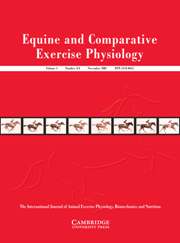Article contents
Relationship of insulin sensitivity to aerobic capacity in Standardbred mares and geldings
Published online by Cambridge University Press: 09 March 2007
Abstract
The objective of this study was to determine the relationship between insulin sensitivity and aerobic capacity and serum adipocytokine (leptin, adiponectin) concentrations in 14 mature, unconditioned Standardbred horses (eight mares, six geldings). Each horse underwent a euglycaemic–hyperinsulinaemic clamp (EHC) and a frequently sampled intravenous glucose tolerance test (FSIGT) for assessment of insulin sensitivity. Aerobic capacity was determined by measurement of the peak rate of oxygen uptake (V˙O2peak) during an incremental exercise test (IET). Serum leptin and adiponectin concentrations were measured in baseline samples obtained before tests of insulin sensitivity. Mean body weight, condition score, V˙O2peak and run time during the IET did not differ between the sex groups. However, minimal model analysis of the FSIGT showed that insulin sensitivity (SI, ×10−4 l mU−1 min−1) was higher (P = 0.002) in geldings (4.21±0.78) than in mares (2.43±0.95), while the acute insulin response to glucose (AIRg) and glucose utilization independent of insulin (SG) were significantly higher in mares. Similarly, glucose uptake (M) per unit of serum insulin (I) during the EHC (M/I ratio) tended (P = 0.08) to be higher in geldings than in mares (×10−2 mg kg−1 min−1 per μU ml−1: 2.41±0.64 vs. 1.80±0.51). There was no significant relationship between V˙O2peak and measures of insulin sensitivity. Stepwise multiple linear regression modelling determined that sex (65%) and leptin concentrations (13.7%) accounted for 78.7% of the variance in SI, while 46% of the variance in M/I could be attributed to sex. It was concluded that aerobic capacity is not an important determinant of insulin-mediated glucose disposal in mature, untrained Standardbred horses. Further studies are needed to examine the influence of gender on insulin sensitivity in horses.
- Type
- Research Article
- Information
- Copyright
- Copyright © Cambridge University Press 2005
References
- 2
- Cited by


